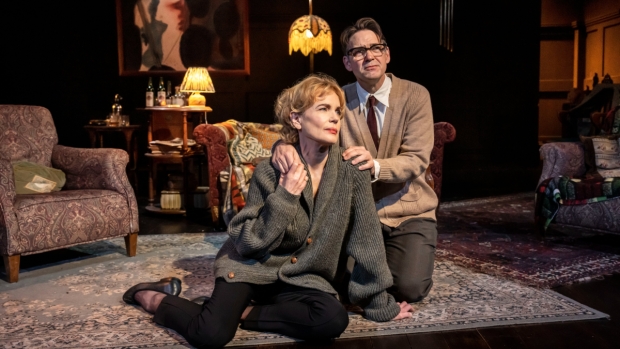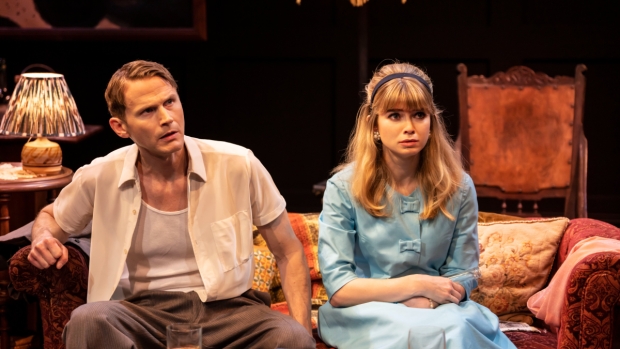”Who’s Afraid of Virginia Woolf?” at Ustinov Studio Bath – review

© Johan Persson
Edward Albee’s 1962 marital bloodbath seems to gain resonance in every new production. Told through one long night’s journey into dawn we see university professor George (Scott) and his wife Martha (McGovern) tear chunks out of each other and their guests in a series of ever more hostile games that culminates in an exorcism of sorts. Written at the height of the Cold War, Albee’s exploration of illusion versus truth still seems pertinent today in a world where the two can intermingle side by side.
Posner’s production features coruscating, skin-tearing acting performances from his quartet of performers. McGovern has never been better than the brittle, bruising Martha, blowsy to begin with, swaying sozzled in four-inch heels, her hands flapping constantly as she lights another cigarette, she is both viper and mouse. There is something of the child in this Martha, a sense of innocence having been crushed by the brutal world she has encountered. McGovern lets you in on the young woman that she may have been, optimistically believing that George and she would conquer the world before seeing that dream die on the vine, turning bitter as a result. As she seduces in front of her husband, desperate for him to intervene, we see the young girl acting out, pushing her boundaries but desperate for an intervention that doesn’t happen. McGovern, an actor I’ve always admired but never loved, offers up a performance here that puts her on a pantheon of great Marthas in which I include Kathleen Turner and Imelda Staunton. As she delivers her lines about needing to punish George for seeing and loving her, we see ultimately the lost girl who doesn’t believe she deserves the man she can’t ever quite let go of.
Scott’s portrayal is perhaps more surprising but no less effective as a result. His George early on feels a performance, a man playing at being an intellectual, each syllable stretched out as he comes to a line ending. It’s an artifice that has become reality – a sly nod to Albee’s overall theme. Buttoned up, hunched over, this is a man who has had a lifetime of regret and been left scarred as a result. It feels like an unfair marital scrap, a gladiator versus a tired civilian but he has his own tricks up his sleeve. But even as he begins to get the upper hand, the cost is never far from the surface. Left alone on stage, he violently throws his book to the floor as he realises his game of ‘hump the host’ is about to become reality.

© Johan Persson
As the younger couple, Nick and Honey drawn into the marital war zone Charles Aitken and Gina Bramhill are also terrific in suggesting a pairing who are well on their way to becoming the next generation of warring couples. Aitken brings youthful swagger and arrogance as the biologist, believing his time is now but holding his pain just below the surface. Bramhill’s pain on the other hand is mixed in with the all-American pertness, smiles topped up with consistent liquor, and her needs and fears never articulated but brought up, literally, in a spew of vomit.
The Ustinov has always been the venue to witness colossal acting performances close up and this Who’s Afraid Of Virginia Woolf? offers this in spades. Yet it’s the laughter that haunts you, and you are left to question, will it ever return?














